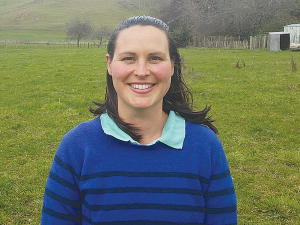Simon Upton urges cross-party consensus on New Zealand environmental goals
Parliamentary Commissioner for the Environment Simon Upton is calling for cross-party consensus on the country's overarching environmental goals.
 Dr Lydia Cranston is supervising a sheep nitrate leaching study being carried out by Massey University by a PhD student Sarmini Maheswaran.
Dr Lydia Cranston is supervising a sheep nitrate leaching study being carried out by Massey University by a PhD student Sarmini Maheswaran.
While it is well known that nitrate leeching is a major problem with cattle – both dairy and beef – what about with sheep grazing?
Nitrate leaching can occur under livestock grazing when excess protein is excreted in urine. This results in high nitrogen loading in the soil with any nitrate, which is not taken up via plants, leached through the soil profile when drainage occurs. This can lead to reduced water quality and – at high concentrations – it can be harmful to human health.
Currently there is a lack of data to suggest whether the level of nitrate leaching from sheep grazing is of concern under New Zealand conditions.
Massey University has an established dairy cattle nitrate leaching study, which has quantified nitrate leaching levels and identified some mitigating strategies – such as the use of plantain in pasture mixes. A similar sheep grazing study, which began in June 2019, has been designed to compare nitrate leaching on four different forage types:
• Perennial ryegrass/white clover,
• Italian ryegrass/white clover,
• Plantain/white clover, swedes.
The study is being carried out at Massey University by a PhD student Sarmini Maheswaran and is being led by sheep production scientist Dr Lydia Cranston. Other Massey colleagues are also lending support to the study: including soil scientists, agronomists and animal scientists.
A parallel study has also been setup in Ireland, which – combined the Massey research – will allow data from two drainage seasons to be collected each calendar year.
The differing growth patterns and grazing management of the above forage types should highlight the possible range of nitrate leaching under sheep grazing. For example, the higher winter growth rates of Italian ryegrass are likely to utilise more the nitrogen available in the soil and thereby reduce nitrate leaching. While, the high stocking rates utilised to graze swedes may increase nitrate leaching.
The experiment site includes 20, hydrologically isolated plots. This allows for the complete capture of all drainage water and a larger supporting farmlet.
This full capture is the only one of its kind in New Zealand.
It will enable nitrate leaching data to be collected alongside pasture data and sheep performance data, so that each pasture treatment to be assessed as part of a whole farm system analysis.
The study will run for at least three years in order to compare year-to-year variation.
Two kiwifruit orchards in the Bay of Plenty and one in Northland are this year's finalists for the Ahuwhenua Trophy competition.
The Government's chief science advisor, Dr John Roche says the key objective for the science sector in the coming year is bedding down the reforms which sees the merger of the previous entities.
Hawke's Bay apple grower Taylor Corporation says a standout 2026 season, coming after a few difficult years, is boosting optimism among growers.
Horticulture New Zealand (HortNZ) has added its perspective to numerous primary sector voices urging the Government to strengthen its draft legislation to replace the Resource Management Act (RMA).
The Commerce Commission has finalised new information disclosure requirements for local councils and water organisations that deliver water supply and wastewater services.
Beef + Lamb NZ (B+LNZ) is calling for significant changes to the Government’s reforms to the Resource Management Act (RMA).

OPINION: The proverbial has really hit the fan in Wellington and exposed a glaring example of a double standard in…
OPINION: Dark suited spin doctors exist to, well, spin, and the nice cuddly progressive types at Greenpeace Aotearoa practice this…